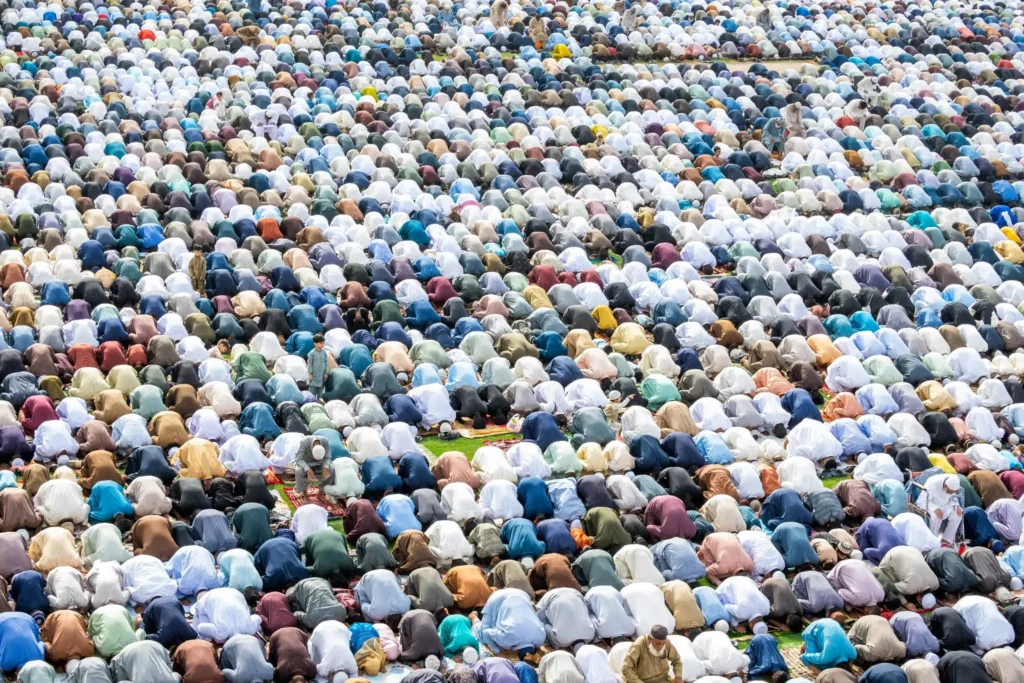As the Holy Month of Ramadan overlaps with the final streak of the UEFA Champions League, players, clubs and brands accommodate their needs to ensure both the physical and economic side of the game keeps up
Back in April of 2021, players from both Leicester and Crystal Palace came together for a break in the 35th minute of the match they were playing against each other. It was scheduled for the moment the sun set, and they did it out of respect for Leicester’s Wesley Fofana who, at the time, was in the midst of Ramadan and was able to break the fast he had kept since the morning.
The moment, which for Fofana showcased “what makes football wonderful after the game”, represented a very significant landmark in football, particularly as the framework of the industry would soon start to shift into an international market that highlighted countries with a predominantly Islamic population. And, most importantly, it set a precedent that, in just a few years, has become a standard.
THE SUPPORT FROM THE PREMIER LEAGUE
Australia’s A-League announced in February of 2024 that they were introducing special in-match pauses to allow players observing Ramadan to break their fast during matches, following the example of the MLS or the UK’s Premier League, which has been particularly vocal in their support of their Muslim players. During the 2023 season, for instance, the league stopped a total of eight matches to allow Muslim players to eat and drink on the pitchside.
In fact and before the breaks where established, there have even been cases of players kicking the ball out of bounds to allow Muslim players to break their fast on the sidelines without actually interrupting the game, and even faking injuries during a match to enable his teammates to seize the opportunity and the confusion to drink and eat. Fortunately, this will no longer be necessary.
WHAT IS RAMADAN?
First and foremost, Ramadan is the Arabic name for the ninth month of the Islamic calendar, which Muslims believe to be the month in which the first verses of the Quran were revealed to the Prophet Muhammad more than 1,400 years ago.
It is considered to be the holiest in their religion, and it is observed as a period dedicated to prayer, reflection, and community. Of course, it is also widely known as the month when Muslims fast through the day: they are not allowed to eat or drink until the sun sets, when they break their fasting with a meal called iftar.

Because the beginning and the end of the month are determined by the sighting of the new moon, there is not a set date that signals when to start the celebration. And, as the lunar year is shorter than the solar year, Ramadan also starts around eleven days earlier than it did the previous year.
As of lately, however, the dates of Ramadan have fallen between the months of March and April, which has coincided with the last stretch of several football competitions, including the UEFA Champions League. And, for Muslim football players and their clubs, that has been quite a challenge.
NUTRITION IN FOOTBALL DURING RAMADAN
Of course, fasting for football players means that they are under a highly demanding physical routine while under reduced sleep schedules ―eating at sundown means less time for sleeping― and, at the same time, not being able to, for example, drink water after training in the morning.
«One of the critical points is dehydration, because it can impair sports performance and increase the risk of injury”, explained Athletic de Bilbao’s nutritionist Catalina Carabias, who oversaw Quicala Bari’s diet, the only Muslim player in the team, during Ramadan in 2023. “We must choose foods with more water, fruit and vegetables, and introduce vegetable cream and soup. It is essential to ensure fluid intake before going to bed and at dawn to try to maintain hydration,» said the Club’s dietician.
«We have to distribute all the nutrients that a soccer player should consume in two instances, the first one being dinner. We will maintain a normal ritual with the teammates at dinner and add a vegetable cream with protein. In addition, the idea is to look for liquid alternatives, with shakes, oatmeal and milk», she further explained.
CELEBRATED MUSLIM STARS
But Ramadan isn’t news around the world, nor in the football industry. In fact, around a third of the world’s population are Muslim, which means it would be inevitable that some of the finest footballers would be too: Mohamed Salah, N’Golo Kante, Paul Pogba and Riyad Mahrez ―notably all of them except for Pogba playing in British teams― are all Muslims, as is world-recognized and Real Madrid’s all-time second-highest goalscorer Karim Benzema, who notoriously scored a hat-trick against Chelsea in 2022 after fasting all day.
HOW ARE TEAMS ADAPTING TO RAMADAN
Of course, making things easy for players comes from their management. For instance, football organisations such as the Qatar Sports League have pushed their schedules in recent years: If outside of Ramadan, training and matches generally start around 6:30, during the holy month, they are postponed until sunset to allow for players to eat and drink before stepping onto the field.
Following this measure, QNB’s Al Gharafa’s head coach Pedro Martinez explained that he “doesn’t see any difference during Ramadan”. As he pointed out, “pushing matches later in the day was probably the only minor change, which forces training to take place at a similar time. It takes time to adjust to, but the players are generally in good conditions and the team is not struggling with any injuries”.
AL-NASSR’S CHANGES IN AND OUTSIDE THE PITCH
But club strategies not only apply on the pitch, because it is important to realise that while Ramadan has to be taken into account for the players, a lot of football fans are following a different schedule to be able to contemplate prayer and fasting. And Al-Nassr, for instance, is adapting to both.
“Obviously, it is very different for players, and our games might be starting at after ten at night, Saudi time”, explained to World Football Summit Alwaleed Almuhaideb, Head of Media and Communications at Al-Nassr FC. “But the schedule of content will change too. Our social media posts will shift mainly to the night period, and we will be posting on social media until very late. It will be very normal to post from one to four in the morning, because people will be awake until that time, to eat the last meal before fasting again in the morning. People staying up very late is part of the culture, and we want to reflect that in our team”.
BRANDS AND FOOTBALL DURING RAMADAN
And, as much as clubs are adapting to Ramadan, brands are seizing the opportunity to send a message of inclusivity as well as selling their product. Perhaps most celebrated is the Adidas X Ramadan 2023 campaign created for the Swedish market ―a country where Muslims represent around 8% of the population, accounting for approximately one million people.
The campaign, focused on delivering the message that people can continue their fitness regime during Ramadan and that fasting should not stop them from working out, wanted to highlight that staying fit and active during the Holy month is achievable with the correct approach.
The campaign featured Swedish footballer Nabil Bahoui and boxer Zahra Al-Mougrabi, and they shared their experiences as Muslim athletes, as well as tips for maintaining their fitness routine while fasting. “Adidas encourages everyone to stay active and healthy, even during Ramadan”, the brand claimed. And, from World Football Summit, we want to extend the same message: in our vision of a better industry there is room for everybody.


